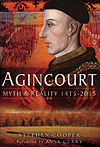
Agincourt: Myth & Reality, 1415–2015, by Stephen Cooper, Praetorian Press, an imprint of Pen & Sword Books, Barnsley, U.K., 2014, $32.95
The 1415 Battle of Agincourt is among the most celebrated of English victories—highlighted by the drama of two kingdoms’ fates and the heroics of Henry V, whose untimely death in 1422 made him, in the words of author Stephen Cooper, the “James Dean of his age.” It was perhaps the last great victory of the longbow, supplanted over the next century by the Swiss pike and handgun of the German Landsknecht. For the French however, Azincourt (as they call it) is just one among many military disasters they have endured in their long history.
What we know of Agincourt comes from 26 unreliable chronicles—10 written in England and 16 in France, and only four of which were written within a decade of the battle. Troop numbers are debatable, though the emerging consensus has 5,000–6,000 well led English (“we happy few”) defeating 12,000–20,000 poorly deployed French.
William Shakespeare’s eponymous 1599 play about Henry V, and later movies based upon it, immortalize the king and popularize such bromides as “God is on England’s side” and “one Englishman is worth 10 Frenchmen.” Novels by G.A. Henty (At Agincourt, 1897) and Bernard Cornwell (Azincourt, 2008) reinforce these notions, though historians such as Desmond Seward have been critical of Henry, particularly his execution of prisoners. Unlike recent commemorations at Bannockburn (1314), site of a battle waged to defend and define Scottish identity, marking the 600th anniversary of Agincourt in October 2015 will be awkward, as it was an act of English aggression on French soil that evokes the era of imperial adventuring.
Influenced by Ann Curry’s Agincourt: A New History (2005), Cooper has written an accomplished academic work of his own—with impressive illustrations, bibliography and endnotes—that is also accessible to the general reader. Despite minor errors—such as misdating the Battle of Bouvines to 1314 rather than 1214—it is a book well worth reading.
—William John Shepherd




